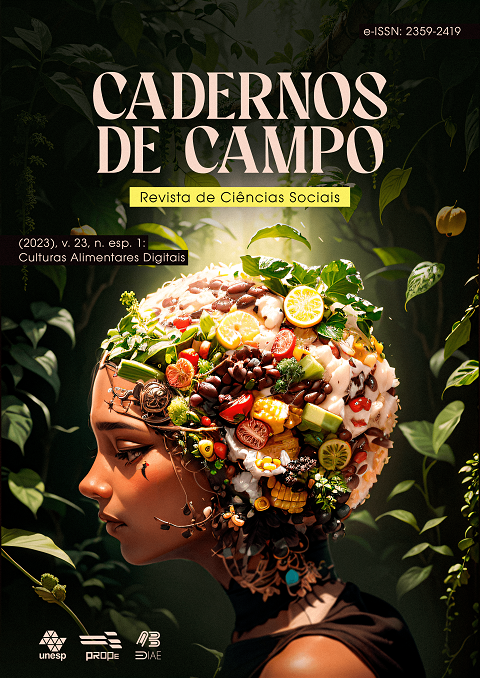Distinction, digitalization, and legitimation
Social media incorporation in the Brazilian gastronomy field
DOI:
https://doi.org/10.47284/cdc.v23iesp.1.17488Keywords:
Gastronomic field, Digital food, Social distinction, Digital sociology, Sociology of foodAbstract
To investigate the relationships between the process of social media naturalization and the dynamics of social distinction, this article mobilizes data from the digital profiles of eight São Paulo restaurants and national and international gastronomic guides on Facebook, Instagram, and TikTok. Additionally, the study incorporates media articles and interviews with chefs and restaurant administrators. Grounded in Bourdieu's theory, the analysis indicates that struggles for legitimacy within the culinary field are impacted by the need to accommodate the pressures of new digitized customer habits. Such accommodation can be perceived as objectionable by the established agents of this field. Through the selected sample, the article explores the various strategies implemented by field agents to prevent the characterization of their efforts as "self-interested." Furthermore, it seeks to establish legitimate modes of incorporating social media into the daily operations of restaurants.
Downloads
References
ABBOTS, Emma-Jayne. The Intimacies of Industry: consumer interactions with the “stuff” of celebrity chefs. Food, Culture and Society, v. 18, n. 2, p. 223-43, 2015.
BAYM, Nancy. Personal Connections in the Digital Age. Cambridge/Malden: Polity Press, 2011.
BOURDIEU, Pierre. The Field of Cultural Production. Nova York: Columbia University Press, 1993.
BOURDIEU, Pierre. Prólogo: Flaubert analista de Flaubert – uma leitura de A educação sentimental. In: BOURDIEU, Pierre. As regras da arte: gênese e estrutura do campo literário. São Paulo: Companhia das Letras, 2000. p. 17-62.
BOURDIEU, Pierre. A produção da crença: uma contribuição para a economia dos bens simbólicos. In: Bourdieu, Pierre. A produção da crença: contribuição para uma economia dos bens simbólicos, 2002. p. 17-112.
BOURDIEU, Pierre. O mercado de bens simbólicos. In: MICELI, Sérgio. (org.). A economia das trocas simbólicas. São Paulo: Perspectiva, 2007. p. 99-182.
BUENO, Maria Lúcia. Gastronomia e sociedade de consumo. Tradições culturais brasileiras e estilos de vida na globalização cultural. In: REINHEIMER, Patrícia; SANT’ANNA, Parracho. (org.). Manifestações artísticas e ciências sociais: reflexões sobre arte e cultura material. Rio de Janeiro: Folha Seca, 2013. p. 89-110.
BUENO, Maria Lúcia. De cozinheiro à chef: de artesão a produtor intelectual. Gastronomia, tradições culturais brasileiras e estilos de vida na globalização cultural. In: ENCONTRO ANUAL DA ANPOCS, 38., 2014, Caxambú. Anais [...]. Caxambú, MG: [s. n.], 2014.
BUENO, Maria Lúcia. Da gastronomia francesa à gastronomia global: Hibridismos e identidades inventadas. Caderno CRH, v. 29, n. 78, p. 443-462, 2016.
CRUMO, Camila. Para comer com os olhos: os restaurantes paulistanos na era das redes sociais. 2022. Orientadora: Maria Helena Augusto. 2022. 240 f. Dissertação (Mestrado) – Faculdade de Filosofia, Letras e Ciências Sociais, Universidade de São Paulo, São Paulo, 2022.
DRIESSENS, Olivier. Celebrity capital: redefining celebrity using field theory. Theory and Society, v. 42, n. 5, p. 543-560, 2013.
FANTASIA, Rick. ‘Cooking the books’ of the French gastronomic field. In: SILVA, Elizabeth; WARDE, Alan. (org.). Cultural analysis and Bourdieu’s legacy: settling accounts and developing alternatives. Nova York: Routledge, 2010. p. 28-44.
FERGUSON, Priscilla. A Cultural Field in the Making: Gastronomy in 19th Century France. American Journal of Sociology, v. 104, n. 3, p. 597-641, 1998.
FERGUSON, Priscilla. L’ostentation culinaire. Naissance du champ gastronomique. In: DUBOIS, Jacques; DURAND, Pascal; WINKIN, Yves. (org.). Le symbolique et le social. La réception internationale de la pensée de Pierre Bourdieu. Liége: Presses universitaires de Liège, 2005. p. 93-102.
FISCHER, Claude. America Calling: A Social History of the Telephone to 1940. Berkeley: University of California Press, 1992.
FISCHLER, Claude. A “McDonaldização” dos costumes. In: FLANDRIN, Jeanl-Loui; MONTANARI, Massimo. (org.). História da Alimentação. São Paulo: Estação Liberdade, 2015. p. 647-662.
FOGAÇA, Henrique. Henrique Fogaça: um chef hardcore. São Paulo: Edições Tapioca, 2016.
GLOBALWEBINDEX. GWI Social Summary: January 2014. Londres, 2014. Available at: https://cdn2.hubspot.net/hub/304927/file-462418234-pdf/Content_Marketing/GWI_Social_January_2014_Summary.pdf?submissionGuid=f790bb19-0d98-4796-9a56-84a465d6460b. Accessed in: 21 may 2022.
GUALTIERI, Gillian. Discriminating Palates: Evaluation and Inequality in American Fine Dining. 2018. Orientadoras: Raka Ray e Heather Haveman. 2018. 166 f. Tese (Doutorado) – Graduate Program in Sociology, University of California, Berkeley, 2018.
KOBEZ, Morag. Restaurant reviews aren’t what they used to be: digital disruption and the transformation of the role of the food critic. Communication Research and Practice, v. 4, n. 4, p. 1-16, 2018.
LANE, Christel. The cultivation of taste: Chefs and the Organization of Fine Dining. Nova York: Oxford University Press, 2014.
LÉVY, Pierre. Cibercultura. Rio de Janeiro: Editora 34, 1999.
MARVIN, Carolyn. When Old Technologies Were New: Thinking about Electric Communication in the Late Nineteenth Century. Nova York: Oxford University Press, 1998.
MELLET, Kevin et al. A “Democratization” of Markets? Online Consumer Reviews in the Restaurant Industry. Valuation Studies, v. 2, n. 1, p. 5-41, 2014.
MILLER, Daniel et al. Como o mundo mudou as mídias sociais. Londres: UCL Press, 2019.
PANTZAR, Mika. Domestication of Everyday Life Technology: Dynamic Views on the Social Histories of Artifacts. Design Issues, v. 13, n. 3, p. 52-65, 1997.
POULAIN, Jean-Pierre. The sociology of gastronomic decolonization. In: NAIR-VENUGOPAL, Shanta. (org.). The Gaze of the West: Framings of the East. Nova York: Palgrave Macmillan, 2011. p. 218-234.
PREVIATTI, Débora. Chefs à brasileira: o processo de formação de um campo gastronômico (1961-2018). 2019. Orientador: Alexandre Bergamo Idargo. 2019. 411 f. Tese (Doutorado) - Centro de Filosofia e Ciências Humanas, Universidade Federal de Santa Catarina, Florianópolis, 2019.
RIDENTI, Marcelo. Caleidoscópio da cultura brasileira (1964-2000). In: MICELI, Sérgio; PONTES, Heloisa (org.). Cultura e sociedade: Brasil e Argentina. São Paulo: Ed. Universidade de São Paulo, 2014. p. 21-72.
ROUSSEAU, Signe. Food and Social Media. You Are What You Tweet. Maryland: AltaMira Press, 2012.
SANTOS, Renan; CRUMO, Camila. Quando a religião sobe ao palco: uma análise das contestações católicas à encenação de “Jesus Cristo Superstar”. Ciências Sociais Unisinos, v. 55, n. 2, p. 204-11, 2019.
VAN DIJCK, Joseé. The culture of connectivity: a critical history of social media. Nova York: Oxford University Press, 2013.
VÁSQUEZ, Camilla; CHIK, Alice. “I Am Not a Foodie…”: Culinary Capital in Online Reviews of Michelin Restaurants. Food and Foodways, v. 23, n. 4, p. 231-250, 2015.
WARDE, Alan. The practice of eating. Cambridge: Polity, 2016.
WILSON, Alan. The Use of Mystery Shopping in the Measurement of Service Delivery. The Service Industries Journal, v. 18, n. 3, p. 148-163, 2006.
Published
Issue
Section
License
Copyright (c) 2023 Cadernos de Campo: Revista de Ciências Sociais

This work is licensed under a Creative Commons Attribution 4.0 International License.









